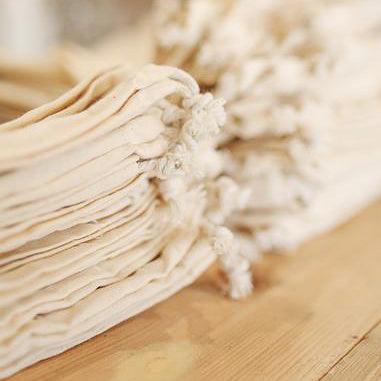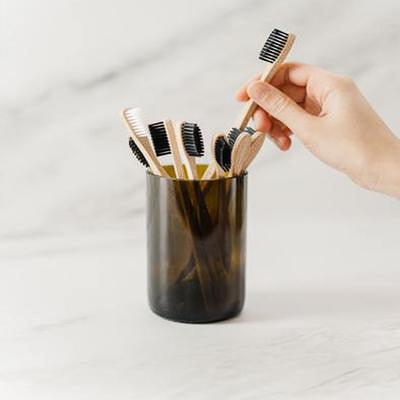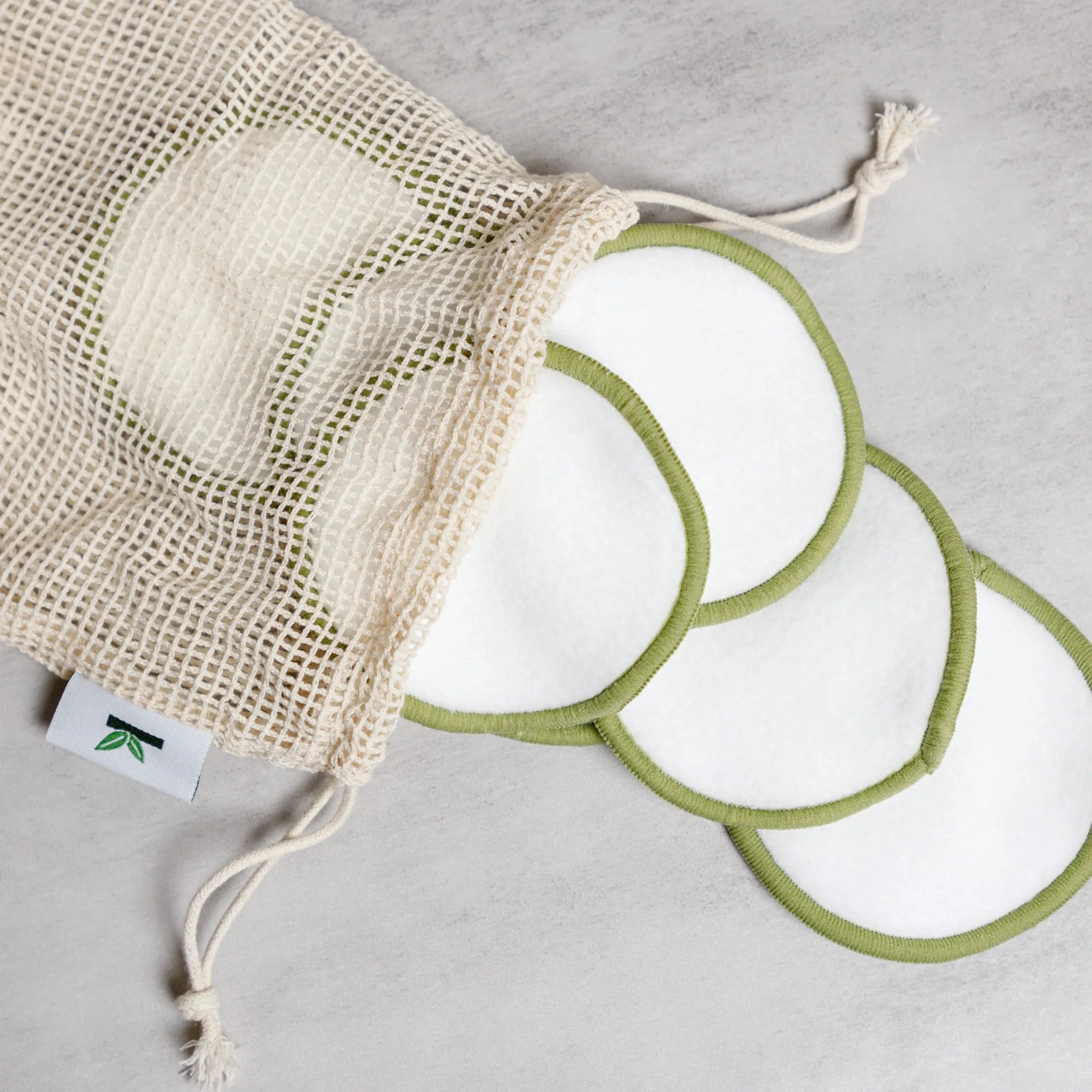If you find yourself looking around your house wondering where all the clutter came from, rest assured, you're not alone. Many people around the world are getting fed up with having extra stuff laying around and have taken to a minimalist approach. But there are a few who go even further and adopt what's known as a zero-waste lifestyle. Let's take a deeper look at this seemingly new trend.
What Is Meant by Zero Waste?
Zero-waste is more than just a buzzword. It's a lifestyle that many people make a commitment to adhere to. It's essentially adapting in such a way that you create basically no waste at all.

What Is a Zero Waste Lifestyle?
Imagine buying groceries, bathroom products and regular household goods, and having nothing to throw away. In short, that's a zero-waste lifestyle. It's caught on with so many people that numerous brands have gotten on board with developing not only products, but packaging that's designed never to see the trash can. Instead, they're compostable and reusable.
A zero-waste lifestyle may seem difficult to get started with, especially if you're used to using high-waste products. But in time, you'll be finding innovative ways to cut down on the waste until you eliminate it altogether. Start by taking small steps and replacing products you can't recycle with those that are not only recyclable, but compostable. More on this in a minute. If you can't find a compostable product, find one that comes in a glass bottle that's reusable — such as coconut oil or olive oil.
Does a Zero Waste System Make a Difference?
It absolutely does! Across the world, landfills are piled high with waste that will never break down, never compost, and essentially just takes up space. With a zero-waste lifestyle, you can add zero-landfill deposits — thus reducing greenhouse gas emissions — and start contributing to the Earth's well-being. We have strived to live in times of a circular economy, where we use and recycle products. However, the sheer amount of solid waste is still a burden on the planet. Waste diversion is a great place to start.

Why Zero Waste Is Important
Pollution is a real issue on this planet, and it comes from the creation of consumable products. As a matter of fact, the current rate of consumption is actually unsustainable and will eventually cause the depletion of natural resources.
But it doesn't have to be this way. How you ask? People can help minimize this depletion by buying products designed to be reused. In the end, this results in buying fewer items made from plastic, and as demand decreases, so does production which stops the over-mining and processing of more than one natural resource.
How to Incorporate a Zero-Waste Lifestyle
If you're ready to take the plunge and start with waste reduction, there are a number of ways you can start adopting these practices. As we mentioned before, it's a good idea to look into compostable items. Why? Because while it's a good idea to recycle, not every town, city or county has the facilities to recycle. This means those products still end up in a landfill and many packaging items take years, if not decades, to break down. Some don't break down at all.
Composting, however, has two benefits. One, you don't throw the products out. You simply create a composting heap and they break down on their own, typically within a matter of days, weeks or months, depending on the product. Two, it cuts down on the amount of waste you're sending out to the curb each week.

Benefits of Going Zero Waste
If you're looking for more reasons to adopt a zero-waste lifestyle, we've got you covered. The benefits can be broken down into several categories, including environmental, personal and economic.
Environmental Benefits
In addition to saving Mother Earth from turning into a garbage heap floating through space, you'll:
- Help minimize pollution — Less waste means less production of wasteful product packaging, which cuts down on manufacturing and disposal facilities. Ditch the single-use plastics for containers you can re-use.
- Reduce impact on marine life — How many times have you seen the horror stories of turtles getting trapped in can holders or swallowing enormous amounts of small plastic pieces? The truth is no matter how much care you take, some of this inevitably makes it into the sea and affects the fish and aquatic life, including the coral reefs.
- Help reduce global warming — Ask several people about global warming and you'll get a variety of answers, but the truth is greenhouse gas emissions do affect the environment. Less production equals less manufacturing and fewer emissions.
Personal Benefits
There are a number of personal benefits to setting up a zero-waste plan, too. In addition to feeling good about cutting back on contributions to the landfill, you'll also:
- Cut down on lower-quality products — With a zero-waste lifestyle, the focus is on high-quality products that last. You may spend more upfront, but over the long term, you'll save money.
- Eat healthier — One of the primary focuses of the zero-waste lifestyle is also buying products that have minimal waste. For example, instead of pre-packaged foods, you're encouraged to cook from scratch with produce and meat, both of which typically don't come in excess plastic packaging. Plus, you can skip the plastic bag for your produce and ask your butcher to wrap your meat in paper instead of a plastic or styrofoam container.
- Foster good habits — Think about what you like to do on your day off. When you start to take a more mindful approach, you're less likely to do things that involve products that waste packaging and more likely to get out in nature and appreciate your surroundings as you work smarter to improve Mother Nature.
Economical Benefits
How does going zero-waste have economical benefits, you ask? Especially since the idea is to buy — and assumptively spend — less? Here's how:
- Eliminate meaningless spending — This is certainly economical for your wallet, right? Instead of buying something that has a million ingredients, for example, you'd be more likely to buy the ingredients and make your own. This can apply to anything from cleaners to salad dressing. If you buy only what you need you also reduce your waste costs.
- Cut back on food waste — One of the considerations zero waste goal is to cut back being tossed out each day. Becoming more mindful can help to reduce your food waste costs and if you're in danger of food going bad, it's always good to donate it to a food bank or kitchen that can put it to use. Many people wonder, can you really grocery shop zero waste? The truth is it'll take some time and getting used to, but yes, you really can.
Identify Rooms Where Waste Is Prominent
One of the ways to start cutting back is to identify rooms in your home where waste is prominent. For example, do you use a lot of paper towels in the kitchen? A lot of us are guilty of this. Same goes for toilet paper in the bathroom, most of us use more than we need to. Think about investing in a reusable container or two to contain your storage and a reusable bag for when you go food shopping — or any kind of shopping, really.

Set Up a Compost Heap
With the zero-waste lifestyle, instead of filling up the trash can, you'll be filling up the compost heap. Most of us don't have enough space to create the type of compost heap we'd like, but you don't need a lot of land to get started. As a matter of fact, if you live in an apartment or condo, you can even use your balcony.
You have to decide where you want the compost heap, but there are criteria you'll want to meet. Full-on sunlight is bad because it'll dry the heap out and cut back on its breakdown time. It should also be close to a water source.
A healthy compost heap has a mixture of green and brown materials. Green materials include items like coffee grounds, tea bags, grass clippings and manure. These are nitrogen-based. Brown items are carbon-based and include items like egg cartons, yard waste (leaves, needles, pine cones, branches), shredded papers such as tissue, mail or newspaper.
Ideally, you'll have a 1:2 ratio of green to brown items. Keep it relatively moist, but not soaked and make sure you turn the pile regularly to help the contents break down.
Going Zero Waste in the Kitchen
Believe it or not, going green in the kitchen isn't really that hard. It's a matter of changing out specific items and then adopting zero-waste products. For example, do you like your morning (or afternoon) coffee? Toss out the typical drip coffee maker and instead opt for a french press. No more need for disposable or plastic filters that don't biodegrade.
While you're at it, throw out the plastic storage bags, plastic wrap and aluminum foil. These sit in the landfill for eons. Instead, invest in glass storage containers with lids. They're airtight and work much better. Yes, it's an investment upfront, but you'll save money in the long run as you won't have to replace them, ideally, ever.
Paper towels? Say goodbye. At least to the regular brand you typically buy on the shelf at your local Piggly Wiggly. Instead, choose a bamboo paper towel option. Not only are they reusable, but you can throw them in the washer and dryer! Each single towel will get you at least 75 uses, so while the rolls are often smaller — around 30 sheets — they last much longer. Then, when they've reached the end of their usable life, you can toss them in the compost heap with the food scraps.
Other popular kitchen items you can use to cut down on your waste include:
- Bamboo straws
- Dishcloths instead of sponges
- Linen cloths for storing bread
- Bamboo cutlery set
Just remember, you don't have to purge your kitchen all at once. Start gradually, replace one item a week and before you know it, you'll be well on your way to a sustainable household or commonly referred to as a zero-waste kitchen.

How to Start a Zero Waste Bathroom
You might find yourself wondering: what's so great about a minimalist bathroom? The truth is you can really cut back here — it really ranks high on the zero waste hierarchy. Think about how many products you use in the bathroom. For example toilet paper, cotton swabs, face cleaner, make-up, and so on. Most of these can be replaced with sustainable, if not low waste or zero-waste products. Let's take a look at a few ideas.
- Toothbrushes — Most toothbrushes have plastic handles that never make it to the recycling facility. Instead, they sit in a landfill for long periods of time. You can replace these with a bamboo toothbrush. They last just as long but break down within a few months in a compost heap. Add in some natural toothpaste tablets, and you'll be on your way to clean living, and we're not just talking about your breath!
- Cotton Swabs — Believe it or not, you can buy 100% biodegradable cotton swabs. The sticks are made with bamboo while the swab part is bamboo cotton. They work well for multiple tasks including cleaning ears, painting nails and even cleaning.
- Reusable Cotton Rounds — If you use these to wash your face or apply your makeup, you're contributing waste to the landfills every day. Bamboo reusable cotton rounds give you the same function, with added versatility. How, you ask? Easy — they're washable! Use them to wash your face or remove makeup and then toss them in the wash with some laundry detergent.
- Toilet paper — If there's anything that's most prominent in the bathroom, this is it. Those who have switched to bamboo toilet paper rave about it. It's not only easy on the environment, it's sturdier and comes with more sheets than your standard cotton roll. Plus, the packaging contains no plastic and you can even sign up for a subscription to ensure you never run out.
There are many more things you can do in the bathroom. For example, get rid of your disposable razors, buy natural cleansers such as Konjac Sponges or Sea Sponges, make the switch to organic soaps and shampoo bars, and ditch the ones that come in a plastic bottle. Choose charcoal toothpaste that comes in a glass jar, which you can repurpose long after the powder is gone and opt for a menstrual cup over a tampon or sanitary pad. All of these are ways to make an impact.
Take the Plunge — You Won't Be Sorry
Getting started on a zero-waste program may seem cumbersome, but it's really not. With the rise of awareness and the availability of several zero-waste stores, it won't be long before you're not only adopting but thriving, at waste management.




